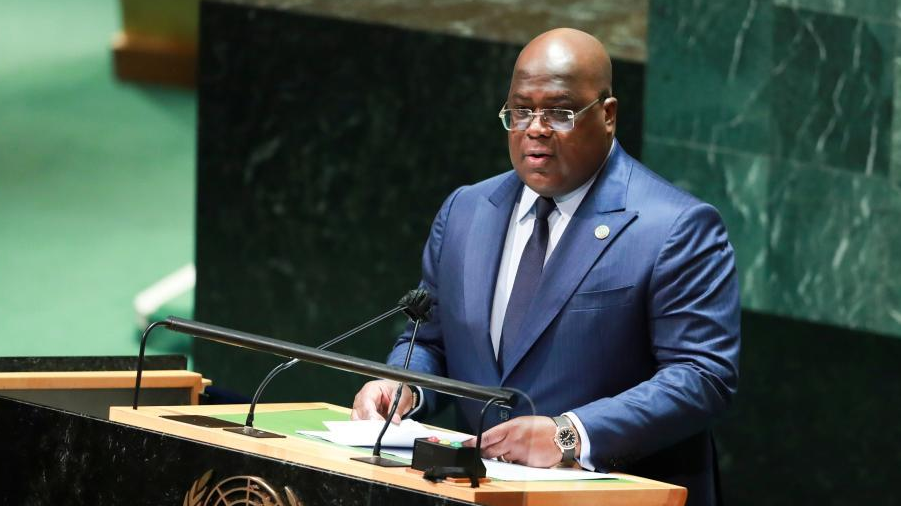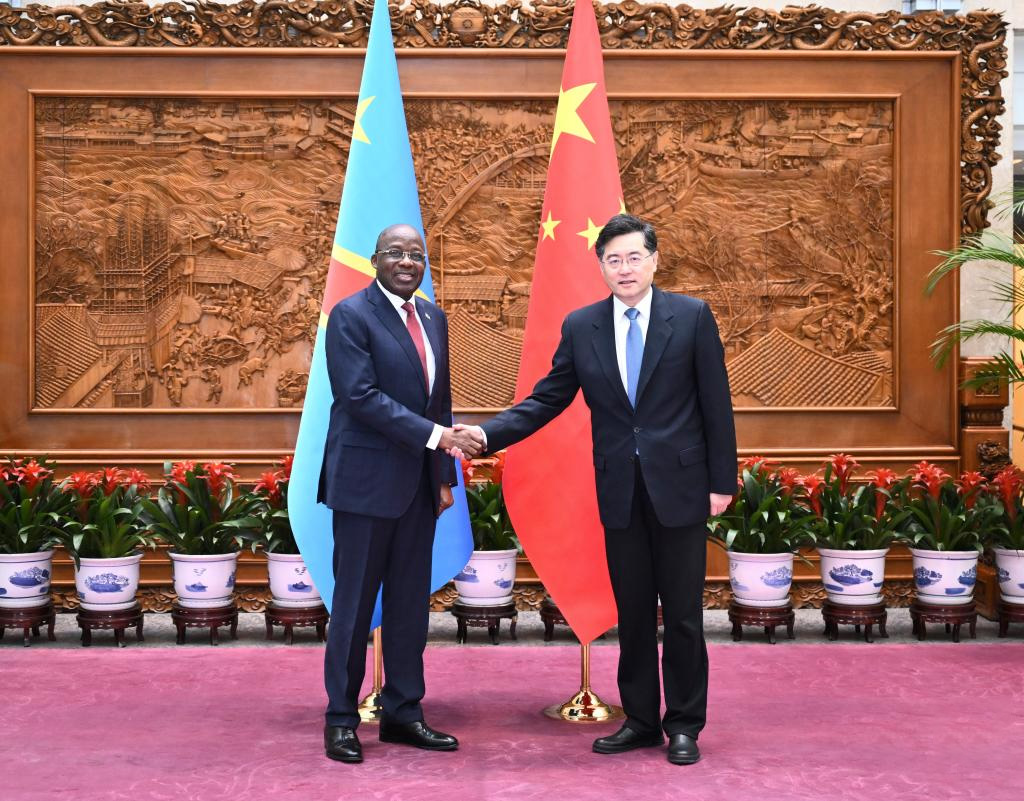
President of Democratic Republic of the Congo Felix Tshisekedi Tshilombo. /Xinhua
President of Democratic Republic of the Congo Felix Tshisekedi Tshilombo. /Xinhua
Editor's note: Stephen Ndegwa, a special commentator on current affairs for CGTN, is the Executive Director of South-South Dialogues, a Nairobi-based communications development think tank. The article reflects the author's opinions and not necessarily the views of CGTN.
When he lands in Beijing on May 24 for a state visit, President of the Democratic Republic of the Congo (DRC) Felix-Antoine Tshisekedi Tshilombo will have a full agenda. His relatively long stay means that there is a lot to talk about, a clear sign of the vast potential between the two partners.
Since China established diplomatic relations with the DRC in November 1972, the two countries have weathered many storms and enjoyed many benefits as well in the five-odd decades. The DRC has upheld the one-China principle which recognizes the Taiwan region as the legitimate territory of China. The DRC is a member of the Forum on China-Africa Cooperation (FOCAC), and joined the Belt and Road Initiative (BRI) in 2021.
The "Resources for Projects" cooperation package between the two partners has progressed the Central African mineral rich country in ways that were otherwise unforeseeable. In addition to giving a strong impetus to the DRC's development of its mining industry, this practical cooperation package has registered infrastructural offshoots such as roads, hospitals, schools, and power plants.
It is estimated that the DRC sits on an estimated $24 trillion worth of raw mineral deposits. The country is the world's largest producer of cobalt, in addition to having significant deposits of diamonds, gold, lithium and tantalum. This is alluring for any industrialized country. Rather than pay hard cash for developing the country's infrastructure and other projects, the two sides agreed to engage in a barter trade involving infrastructure for minerals.
China's main exports to the DRC include delivery trucks, iron structures, and stone processing machines. DRC's exports to China include refined copper, cobalt, and raw copper. This shows the symbiotic trade relationship between the two countries, each helping the other to meet its long-term development goals and needs.
Both sides are driven by the pursuit of mutual benefit. China gets its raw materials; the DRC gets the necessary projects to facilitate its economic growth. Reports indicate that President Tshisekedi has the full approval of his Cabinet to negotiate various trade and cooperation agreements that will help in transforming the DRC's economy.

Chinese State Councilor and Foreign Minister Qin Gang meets with Vice Prime Minister and Foreign Minister of the Democratic Republic of the Congo (DRC) Christophe Lutundula in Beijing, capital of China, May 22, 2023. /Xinhua
Chinese State Councilor and Foreign Minister Qin Gang meets with Vice Prime Minister and Foreign Minister of the Democratic Republic of the Congo (DRC) Christophe Lutundula in Beijing, capital of China, May 22, 2023. /Xinhua
On the occasion of the visit, leaders of both countries are expected to hold in-depth exchanges on China-DRC comprehensive cooperation and jointly chart the course for the future growth of bilateral ties. Even where there could be some sort of misunderstanding, no partner has made it an issue.
As a major investor in Africa, China is happy to see a peaceful DRC. The Chinese government has avoided taking sides or getting embroiled in any of the conflicts in the DRC or the region. Instead, China has used forums like the UN Security Council (UNSC), where it is a permanent member, to appeal to the international community for its input in silencing the guns in the DRC.
In 2016, Wu Haitao, the deputy permanent representative of China to the UN appealed for peace in the DRC. In a speech made to the UNSC, Wu called on the international community to "resolutely promote the political process" and "vigorously promote peace and stability." China is not a country that aims to benefit from the misfortunes of others, or worse, create chaos in order to reap the spoils.
President Tshisekedi is likely to seek China's input in fostering both internal and regional security. In past years, armed groups have been engaged in violent conflicts in the DRC, which have resulted in heavy civilian casualties. Despite his best efforts, President Tshisekedi needs more military and diplomatic support to secure his country.
China's deep involvement with the DRC can act as a stabilizing factor in the sometimes volatile region. The DRC's economic growth can help other countries in the region to focus on improving the lives of their citizens by creating sufficient job opportunities in sectors of competitive advantage.
Chinese President Xi Jinping visited the Republic of the Congo in March 2013. Ten years later, Xi's heart is still where it was initially, and is seeking sound partnerships with countries in the region.
This year marks the 60th anniversary of the Organization of African Union, now known as African Union (AU). It is possible that pan-African issues will be discussed during President Tshisekedi's China trip. Specifically, it is expected that there will be discussions on security, and how the continent's media should seize the occasion to shape the African narrative on the global arena. China has excelled in telling its story to the world, and Africa can learn from China to thwart misinformation by some Western media outlets.
The two partners could also discuss progress made so far in implementation of the FOCAC projects. As the premier platform of cooperation between China and Africa, FOCAC is a barometer of Africa's economic development. President Tshisekedi is expected to take advantage of his China trip to advance his country's development to a new level.
(If you want to contribute and have specific expertise, please contact us at opinions@cgtn.com. Follow @thouse_opinions on Twitter to discover the latest commentaries on CGTN Opinion Section.)